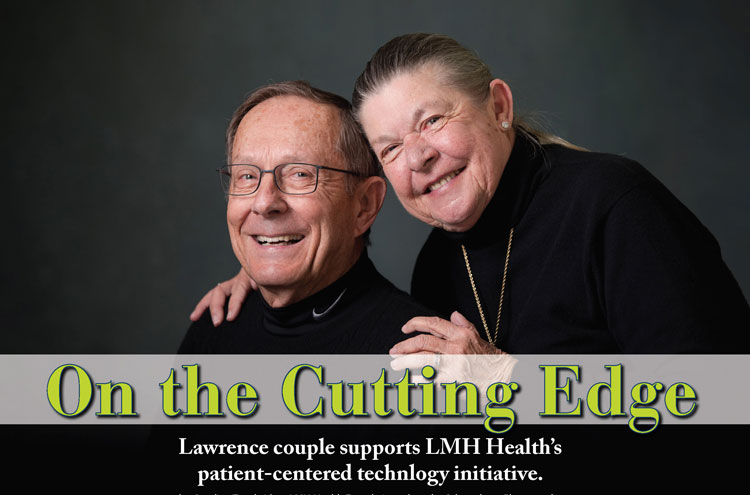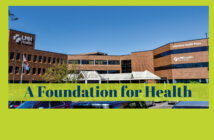Lawrence couple supports LMH Health’s patient-centered technology initiative.
| 2020 Q1 | story by Caroline Trowbridge, LMH Health Foundation, photo by Schaumburg Photography

Sue and Dana Anderson
Sue and Dana Anderson know firsthand how important technology can be for patients at LMH Health.
“The work our doctors do is important to our entire community,” Dana Anderson says. “Sue and I are happy to do what we can to provide them with the very best technology they need to perform at the highest level.”
That’s why the Lawrence couple has pledged $850,000 to LMH Health for new technology that will benefit surgical and heart patients. The Andersons hope their gift—which is the fourth largest in the 50-year history of the LMH Health Foundation—will spark other donors to support:
- a new Mako robotic arm for performing partial and total knee replacements, as well as total hip replacements
- a new Da Vinci Robotic Surgical System to replace the Da Vinci system that has been used at LMH Health since 2013 by general surgeons, urologists and obstetricians/gynecologists
- a second cardiac catheterization lab, commonly referred to as a heart-cath lab.
The estimated cost of the two robots is $3 million, while the final price tag for adding a cath lab has not been finalized. The LMH Health Foundation has committed to help the not-for-profit community hospital purchase the robotics and cath lab.
“We are so grateful to Sue and Dana, and to others who already have stepped up to contribute to this patient-centered initiative,” says Rebecca Smith, executive director of LMH Health Foundation and vice president of strategic communication at LMH Health.
This will help ensure LMH Health patients experience:
- quicker and less painful recoveries after surgeries
- shorter hospital stays and reduced reliance on pain medications
- the many conveniences of having surgery close to home, a benefit to them and their families and friends
- seamless transitions to postsurgical therapy or treatment.
In addition, the new robotic systems will help LMH Health recruit and retain the best physicians to provide excellent care to patients in the region.
“People in a position to give are grateful to learn about opportunities like this,” explains Dr. Jon Heeb, of Lawrence Urology Specialists, who uses the Da Vinci system. “If they find something they feel good about supporting, it brings them joy. Part of the reason patients have good experiences at LMH Health is due to the support our donors have provided.”
A portion of the proceeds from LMH Health Foundation’s upcoming Hearts of Gold black-tie gala will benefit these patient-centered technological improvements at the hospital. Hearts of Gold 2020 is set for May 9 at the Jayhawk Club.
Gifts such as the one the Andersons gave underscore the importance of the role the community plays in making LMH Health a stellar health-care provider.
“When our community members partner with us, we all benefit,” says Russ Johnson, LMH Health president and CEO. “Because of support from the Andersons and our many other donors, our hospital continues to offer the best in patient care services.”
New Robotic Surgical System
In 2013, physicians at LMH Health began using a Da Vinci Robotic Surgical System. The popularity of the Da Vinci, which is far less invasive and can be more precise than traditional surgery, has soared among doctors and their patients. In 2014, a total of 55 robotic surgeries were performed. Last year, that number increased to 400. As one would expect with any type of cutting-edge technology, it’s time to upgrade the LMH Health Da Vinci, which is used by general surgeons, urologists and obstetricians/gynecologists. Often, patients recover more quickly from robotic surgery than traditional surgery.
The new system could provide even better outcomes for patients, explains Dr. Chad Tate, of Lawrence General Surgery.
“The instruments are smaller, and it will rotate and move with the patients’ and doctors’ needs. The optics are better, and we would make a much smaller incision, so there will be less pain for the patient,” he says.
Mako Robotic Arm
LMH Health plans to purchase a Mako robotic arm to assist the hospital’s orthopedists with knee and hip replacements. Dr. Adam Goodyear, an orthopedic surgeon at OrthoKansas, who works with patients who need knee and hip replacements, says the Mako system can be more precise than traditional surgical techniques because it can create a 3-D model of each patient’s joint. Using the system, physicians create a personalized surgical plan. Using the robotic arm, surgeons work within the parameters created and use the arm to assist in placing new joints.
“Recent studies have demonstrated that patients have decreased levels of pain and shorter hospital stays when having a total joint replacement with the Mako system,” Goodyear says. “Our goal is always to provide our patients with proven, cutting-edge orthopedic surgical techniques and technology that can improve patient experience and outcomes.”
Heart Cath Lab
Last year, LMH Health opened its renovated cath lab, and it recently became clear that a second lab would benefit patients. The hospital now is performing electrophysiology procedures, as well as standard cath-lab procedures, says Dr. Roger Dreiling, cath-lab medical director. Electrophysiology focuses on the electrical systems of patients’ hearts, and LMH now performs catheter ablations to treat atrial fibrillation, which often is referred to as “afib.”
“Atrial fibrillation occurs frequently enough that we see the need in our community,” Dreiling explains. “Fifteen percent of Americans will have afib sometime in their life.”




